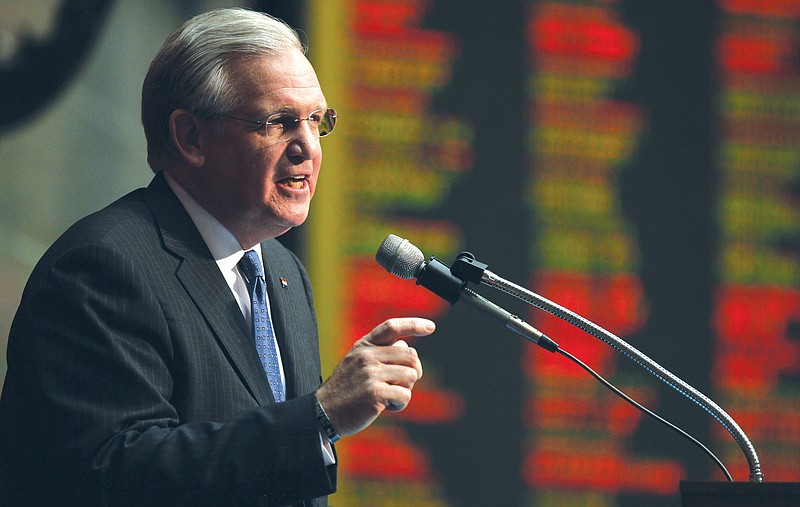Missouri Gov. Jay Nixon proposed a third straight year of cuts to public universities Tuesday while favoring K-12 schools in an election-year budget plan that avoids tax increases and emphasizes efforts to expand private-sector jobs.
Delivering his fourth State of the State address to a joint legislative session, the Democratic governor relished the fact that Missouri's unemployment rate has finally fallen from its recessionary peak to the same level as when he was sworn into office in January 2009.
"Because of our strong leadership, Missouri is once again moving forward," he proudly declared.
Nixon proposed a nearly $23 billion operating budget for the next fiscal year, a slight reduction from the current year's spending. It would cut funding for higher education institutions by 12.5 percent while holding aid for student scholarships steady and would eliminate 816 state positions to help close a projected $500 million gap between expenses and revenues. Employees who remain would be recommended to receive a 2 percent pay raise beginning in January 2013.
Nixon said the employee cuts would reduce the state payroll to its smallest level in 15 years. Although he didn't tout it, funding for higher education institutions also would be at its lowest point in at least the past for gubernatorial administrations.
By proposing a slight $5 million increasing in basic aid to public K-12 schools, Nixon was able to boast that he is providing a record level of funding to elementary and secondary classrooms. But the $3 billion in basic aid is still $477 million less than what's called for by the state's school funding formula, a shortfall that has continued to balloon over several years of underfunding.
Nixon emphasized instances in which he has worked with the Republican-led Legislature to keep "a laser-like focus on job creation," specifically highlighting legislation that led to recent announcements by Ford and General Motors to expand automobile manufacturing plants in Missouri. He also touted proposals Tuesday night to spur more jobs among parts suppliers to the auto factories, increase international exports, put money into incentives for science and technology-based companies and offer job-training subsidies for companies that hire military veterans.
Republican legislative leaders cast a starkly different image of the state's economy and of Nixon's efforts to improve it.
In remarks prepared for a Republican response to be broadcast after Nixon's speech, House Majority Leader Tim Jones declared: "Governor Nixon talks about creating jobs, but Missouri has fallen behind on his watch."
Jones, of Eureka, cited three specific cases in which Nixon's Department of Economic Development has offered state tax incentives to businesses that failed or later had their state aid offers revoked after embarrassing revelations.
Senate Appropriations Committee Chairman Kurt Schaefer, who joined Jones for the official the Republican response, emphasized Nixon's cuts in prior years to public school busing and higher education while noting that Medicaid spending had "skyrocketed" by 24 percent during Nixon's tenure.
"The growing diversion of funding away from programs that assist all our citizens in order to fund an expanding welfare state is simply unsustainable," said Schaefer, of Columbia.
Nixon's budget director, Linda Luebbering, said the governor's proposed budget actually contains a reduction in general revenue spending for Medicaid, based largely on efficiencies his administration has implemented.
Luebbering said Nixon would have loved to recommend more funding for public colleges and universities. But "quite frankly," she said, "we don't have the money."
To balance the budget, Nixon also assumed savings from a restructuring of state debt and an increase in revenue collections through an amnesty period for people with overdue taxes - a proposal that also was part of Nixon's package in 2011 but failed to pass the Legislature.

